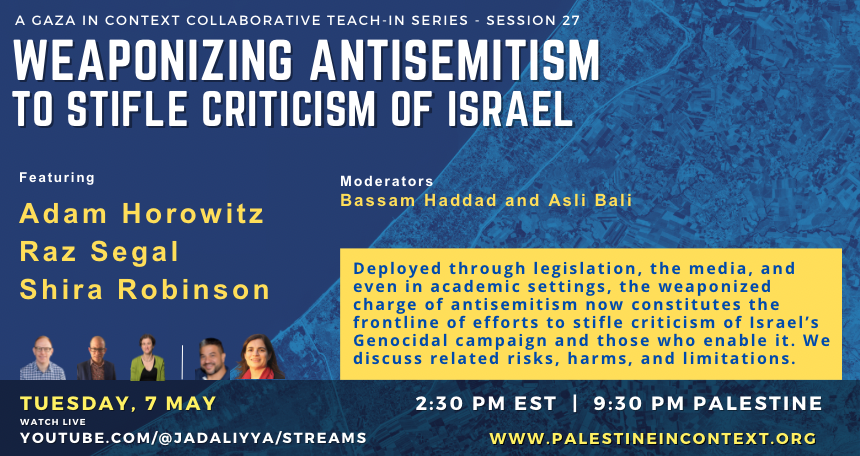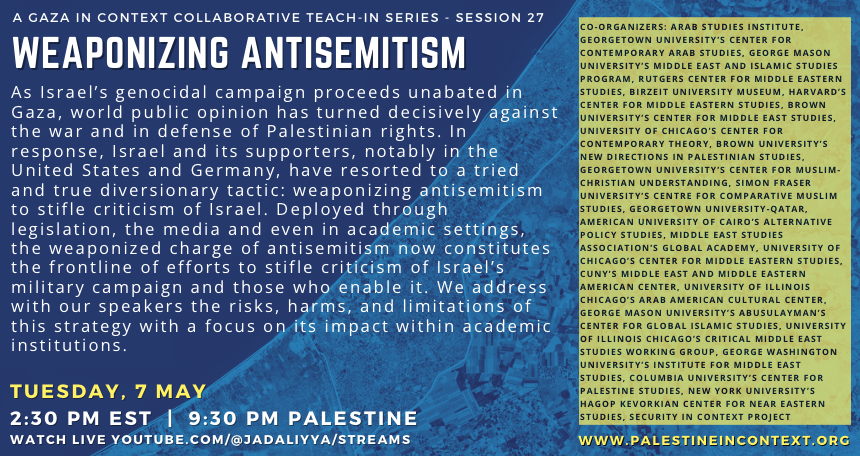Gaza in Context: A Collaborative Teach-In Series — Session 27
Weaponizing Antisemitism to Stifle Criticism of Israel
Featuring:
Adam Horowitz
Raz Segal
Shira Robinson
Moderator:
Asli Bali
Bassam Haddad
Tuesday, 7 May, 2024
2:30 PM EST | 9:30 PM Palestine
WATCH LIVE: YOUTUBE.COM/@JADALIYYA/STREAMS

Teach-In Session 27
Gaza in Context Collaborative Teach-In Series
We are together experiencing a catastrophic unfolding of history as Gaza endures a massive invasion of genocidal proportions. This accompanies an incessant bombardment of a population increasingly bereft of the necessities of living in response to the Hamas attack in Israel on October 7. The context within which this takes place includes a well-coordinated campaign of misinformation and the unearthing of a multitude of essentialist and reductionist discursive tropes that dehumanize Palestinians as the culprits, despite a context of structural subjugation and Apartheid, now a matter of consensus in the human rights movement.
The co-organizers below are convening weekly teach-ins and conversations on a host of issues that introduce our common university communities, educators, researchers, and students to the history and present of Gaza, in context.
Co-Organizers: Arab Studies Institute, Georgetown University’s Center for Contemporary Arab Studies, George Mason University’s Middle East and Islamic Studies Program, Rutgers Center for Middle Eastern Studies, Birzeit University Museum, Harvard’s Center for Middle Eastern Studies, Brown University’s Center for Middle East Studies, University of Chicago’s Center for Contemporary Theory, Brown University’s New Directions in Palestinian Studies, Georgetown University’s Center for Muslim-Christian Understanding, Simon Fraser University’s Centre for Comparative Muslim Studies, Georgetown University-Qatar, American University of Cairo’s Alternative Policy Studies, Middle East Studies Association’s Global Academy, University of Chicago’s Center for Middle Eastern Studies, CUNY’s Middle East and Middle Eastern American Center, University of Illinois Chicago’s Arab american cultural Center, George Mason University’s AbuSulayman’s Center for Global Islamic Studies, University of Illinois Chicago’s Critical Middle East Studies Working Group, George Washington University’s Institute for Middle East Studies, Columbia University’s Center for Palestine Studies, New York University’s Hagop Kevorkian Center for Near Eastern Studies


Featuring
Adam Horowitz is Executive Editor of Mondoweiss.net, a news and opinion website that covers Palestine, U.S. politics, and the movement for Palestinian liberation. Adam has been an activist and writer in the Palestine movement for the last 25 years and previously worked at the American Friends Service Committee before joining Mondoweiss in 2008. Adam is co-editor, along with Philip Weiss and Lizzy Ratner, of The Goldstone Report: The Legacy of the Landmark Investigation of the Gaza Conflict (Bold Type Books).
Raz Segal is Associate Professor of Holocaust and Genocide Studies and Endowed Professor in the Study of Modern Genocide at Stockton University. Dr. Segal has held a Harry Frank Guggenheim Fellowship, a Fulbright Fellowship, and was recently a Senior Fellow at the Vienna Wiesenthal Institute for Holocaust Studies (2023). His publications include Genocide in the Carpathians: War, Social Breakdown, and Mass Violence, 1914-1945 (2016); Days of Ruin: The Jews of Munkács during the Holocaust (2013); and he was guest editor of the Hebrew-language special issue on Genocide: Mass Violence and Cultural Erasure of Zmanim: A Historical Quarterly (2018). Dr. Segal is at work on two new books: one provides a critical account of the history and memory of Holocaust bystanders, the other offers a new analysis of Israeli mass violence from the 1948 Nakba to the current genocidal assault on Gaza. In addition to scholarly publications, Dr. Segal has published op-eds, book reviews, and larger articles on genocide, state violence, and memory politics in Hebrew, English, and German in The Guardian, LA Times, The Nation, Jewish Currents, Haaretz, +972 Magazine, and Berliner Zeitung, and he has appeared on Counter Points, Al Jazeera English, Democracy Now! and ABC News.
Shira Robinson is Associate Professor of History and International Affairs at George Washington University. works on the social and cultural history of the Modern Middle East, with an emphasis on colonialism, citizenship, nationalism, and cultures of militarism after World War I. She joined GW in 2007 after two years of teaching at the University of Iowa and one year as Visiting Fellow at the Davis Center for Historical Studies at Princeton University. She received her B.A. in Middle Eastern and North African Studies from the University of Michigan and her M.A. and Ph.D. in History from Stanford University. Dr. Robinson's research has been funded through the Fulbright Institute, the Social Science Research Council, the Mellon Foundation, and the Palestinian American Research Center. She also spent a year at the Center for the Advanced Study of Arabic at the American University in Cairo. In 2006 her dissertation won the Halpern Biennial Dissertation Award from the Association for Israel Studies. Professor Robinson works on the social and cultural history of the Modern Middle East, with an emphasis on colonialism, citizenship, nationalism, and cultures of militarism after World War I.
Aslı Ü. Bâli is a Professor of Law at Yale Law School. Bâli’s teaching and research interests include public international law — particularly human rights law and the law of the international security order — and comparative constitutional law, with a focus on the Middle East. She has written on the nuclear non-proliferation regime, humanitarian intervention, the roles of race and empire in the interpretation and enforcement of international law, the role of judicial independence in constitutional transitions, federalism and decentralization in the Middle East, and constitutional design in religiously divided societies. Bâli’s scholarship has appeared in the International Journal of Constitutional Law, University of Chicago Law Review, UCLA Law Review, Yale Journal of International Law, Vanderbilt Journal of Transnational Law, Chicago Journal of International Law, Cornell Journal of International Law, Virginia Journal of International Law, American Journal of International Law Unbound, Geopolitics, Studies in Law, Politics and Society, and in edited volumes published by Cambridge University Press and Oxford University Press. She has also written essays and op-eds for such venues as The New York Times, The Boston Review, The London Review of Books, Jacobin, and Dissent.
Bassam Haddad is Director of the Middle East and Islamic Studies Program and Associate Professor at the Schar School of Policy and Government at George Mason University. He is the author of Business Networks in Syria: The Political Economy of Authoritarian Resilience (Stanford University Press, 2011) and co-editor of A Critical Political Economy of the Middle East (Stanford University Press, 2021). Bassam is Co-Founder/Editor of Jadaliyya Ezine and Executive Director of the Arab Studies Institute. He serves as Founding Editor of the Arab Studies Journal and the Knowledge Production Project. He is co-producer/director of the award-winning documentary film, About Baghdad, and director of the acclaimed series Arabs and Terrorism. Bassam is Executive Producer of Status Podcast Channel and Director of the Middle East Studies Pedagogy Initiative (MESPI). He received MESA's Jere L. Bacharach Service Award in 2017 for his service to the profession. Currently, Bassam is working on his second Syria book titled Understanding The Syrian Tragedy: Regime, Opposition, Outsiders (forthcoming, Stanford University Press).